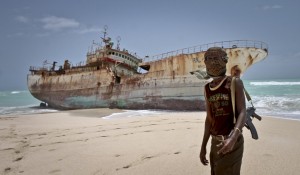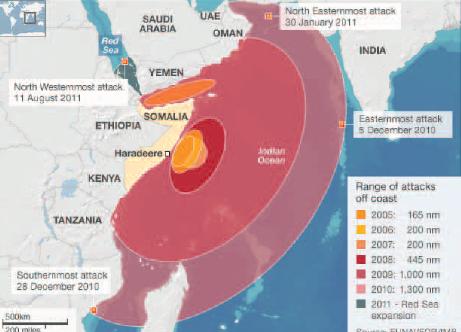This article was originally published in The Huffington Post.

A masked pirate stands by a washed up Taiwanese fishing vessel in the once-bustling pirate den of Hobyo, Somalia. The crew were released after a ransom was paid. Photograph: Farah Abdi Warsameh/AP
One of Somalia’s most prominent pirates, Mohamed Abdi Hassan alias Big Mouth, has announced his retirement. After eight years of capturing ships and their crews and demanding millions of dollars in ransom he also encouraged other pirates to give up this “dirty business”.
“We decided to give it up. We have been in it for a long time. We firstly need the world to stop looting us, as we gave up piracy. Secondly, we need the world to stop hunting us.”
Moreover, it has been announced that the pirates’ leadership will support the Somali Government in warning the youth about the risks of living a life as pirate.
This step is indeed commendable, but does this announcement mean an end to piracy in the eastern part of the Indian Ocean or is it too precipitous to speak about the end of Somali piracy?
In recent months it was repeatedly reported that the number of attempted captures decreased significantly. The presence of EU, NATO and other naval forces did not completely solve the problem of piracy, but reduced the risk for ships significantly. As of now 4 ships and 108 hostages are still under the control of the pirates.
In addition, an increasing number of ships were guarded by armed Vessel Protection Teams, either privately hired by the shipping companies or provided by national forces. In recent days plans for a private Navy by a group of British business executives around Anthony Sharp emerged as well, arguing that
“Deploying a billion-pound warship against six guys [pirates] with $500 of kit is not a very good use of the asset.”
Strikes by naval forces and Somali ground troops on the pirate’s bases might have further decreased the motivation behind piracy.

Warships, such as FGS Rheinland-Pfalz, patrol the Somali Coast, but a pure military approach is insufficient. Photo: BBC
On the legal side of the battle Germany, France and the Seychelles indicted pirates in their own courts and Kenya declared to try pirates as well. Big Mouth’s decision to retire might be based on these various facts. However, it is also noteworthy that he has recently been issued a diplomatic passport by the transitional government of Somalia. This might have served as an incentive.
Notwithstanding the multitude of factors that have decrease the piracy off the Somali Coast, it should be remembered that in this case piracy is a symptom of a failed state. The economic rationale behind the attack seems to have decreased and the danger for the pirate’s life has increased, but the international community would be well advised to focus on the factors to be found in Somalia itself rather than in the Indian Ocean. A pure military and retributive justice approach merely fights the symptoms, not the causes.

This map underlines the vast area in which piracy is a threat. Source: Maritime Security Review
The failure of the Somali Democratic Republic in 1991, followed by war and significant poverty laid the ideal breeding ground for piracy. In the following years the inability of the Somali State to control its coastal waters has been exploited by Somali pirates and foreigners alike.
Illegal fishing fleets, inter alia and rather ironically, from countries which send their navy patrols, use the opportunity to exploit the fish stocks – the very livelihood for many Somalis. The United Nations highlighted this issue in a 2006 report and claimed in a later report that the exploitation amount to USD 300 million per year. In addition, the report also alleged European shipping companies of dumping toxic waste, including radioactive waste, in Somali waters. The effects on the peoples live in coastal region are detrimental. Subsequently, Somali fishermen took up arms and attacked the ships. These fishermen are now known as pirates.
Over the years piracy became a lucrative business – indeed it became Somalia’s boom industry. The rationale had changed from fending off foreign fishing fleets to making money – lots of money. Thus, if the international community attempts to seriously address the problem of piracy, it has to address the symptoms and causes alike. The inability of the Somali Government to control its coastal waters should not be exploited by international shipping fleet and more needs to be done to support the Somali society to rebuild their country.
In the light of current positive developments Somalia seems to have put itself on a positive path leading away from the status of a failed state. Now it is up to the international community to not only respect the livelihood of Somali fishermen, but to provide increased support to the Somali people. The international community should not be complacent so long as the root causes have not been addressed and resolved otherwise the efforts so far might turn out to be futile. Piracy could start again in the blink of an eye.

A good post on the baby steps Somalia is taking to become a fully operational state once again. Though your caution is well founded as too often the international community takes the pressure off and the state degenerates again. Hopefully this is not the case in Somalia.